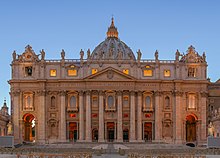
Back Matrimoni canònic Catalan Manželství v katolické církvi Czech Matrimonio en la Iglesia católica Spanish Abielu sakrament Estonian Mariage catholique French Sakrament ženidbe Croatian Sakramen Perkawinan (Gereja Katolik) ID Matrimonio (Chiesa cattolica) Italian 婚姻の秘跡 Japanese អាពាហ៍ពិពាហ៍បែបគ្រិស្តសាសនា Cambodian

| Part of a series on the |
| Catholic Church |
|---|
 |
| Overview |
|
|
Marriage in the Catholic Church, also known as holy matrimony, is the "covenant by which a man and woman establish between themselves a partnership of the whole of life and which is ordered by its nature to the good of the spouses and the procreation and education of offspring", and which "has been raised by Christ the Lord to the dignity of a sacrament between the baptized".[1] Catholic matrimonial law, based on Roman law regarding its focus on marriage as a free mutual agreement or contract, became the basis for the marriage law of all European countries, at least up to the Reformation.[2]
The Catholic Church recognizes as sacramental, (1) the marriages between two baptized non-Catholic Christians or between two baptized Orthodox Christians, as well as (2) marriages between baptized non-Catholic Christians and Catholic Christians,[3] although in the latter case, consent from the diocesan bishop must be obtained, with this termed "permission to enter into a mixed marriage".[4] To illustrate (1), for example, "if two Lutherans marry in the Lutheran Church in the presence of a Lutheran minister, the Catholic Church recognizes this as a valid sacrament of marriage".[3] On the other hand, although the Catholic Church recognizes marriages between two non-Christians or those between a Catholic Christian and a non-Christian, these are not considered to be sacramental, and in the latter case, the Catholic Christian must seek permission from his/her bishop for the marriage to occur; this permission is known as "dispensation from disparity of cult".[5]
Weddings in which both parties are Catholic faithful are ordinarily held in a Catholic church, while weddings in which one party is a Catholic faithful and the other party is a non-Catholic can be held in a Catholic church or a non-Catholic church, but in the latter case permission of one's Bishop or ordinary is required for the marriage to be free of defect of form. [6]
- ^ "CIC".
can. 1055 §1
- ^ Studies in Polish and Comparative Law, forgotten books.com, Retrieved 7 July 2014, Association, Polish Lawyers'. (2013). pp. 156-7. Studies in Polish and Comparative Law: A Symposium of Twelve Articles. London: Forgotten Books. (Original work published 1945)
- ^ a b Foster, Michael Smith (1999). Annulment. Paulist Press. p. 83. ISBN 9780809138449.
The Catholic Church considers marriages of baptized Protestants to be valid marriages. So if two Lutherans marry in the Lutheran Church in the presence of a Lutheran minister, the Catholic Church recognizes this as a valid sacrament of marriage.
- ^ Burke, John (1999). Catholic Marriage. Paulines Publications Africa. p. 98. ISBN 9789966081063.
We might remind ourselves here that a marriage between a Catholic and a baptized person that takes place in the Catholic Church, or in another Church with permission from the diocesan bishop, is a sacramental union. Such a marriage is a life-long union and no power on earth can dissolve it.
- ^ "Are non-Catholic marriages valid in the eyes of the Catholic Church? What if a Catholic marries a non-Catholic?". Catholic Answers. 1996. Archived from the original on 21 December 2013. Retrieved 16 June 2015.
Supernatural marriages exist only between baptized people, so marriages between two Jews or two Muslims are only natural marriages. Assuming no impediments, marriages between Jews or Muslims would be valid natural marriages. Marriages between two Protestants or two Eastern Orthodox also would be valid, presuming no impediments, but these would be supernatural (sacramental) marriages and thus indissoluble.
- ^ "Frequently Asked Questions about Marriage in the Catholic Church". Roman Catholic Archdiocese of San Antonio. 2020. Retrieved 30 November 2020.
If the wedding is celebrated in the Catholic Church, the priest presides, and a non-Catholic minister can be present as a witness. If the wedding takes place in a non-Catholic church, the minister presides, and a priest/deacon may be present to offer a prayer and blessing.
© MMXXIII Rich X Search. We shall prevail. All rights reserved. Rich X Search